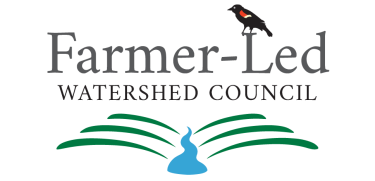Tara Daun is Farmer-Led Watershed Coordinator for Hay River, Horse Creek, Dry Run, & South Kinnickinnic Watersheds.
Instead of paying for fancy big-names from out of state, farmers are choosing to invest in local knowledge and farmer expertise at this year’s regional event.
Corn-soybean farmers in northwest Wisconsin and east central Minnesota will be getting together in February to talk about how they can control their input prices while enhancing farm profits. While there are many ways to do that, a major opportunity for farmers in our region is expanding soil health practices. For local farmers that means efficient use of nutrients, reducing erosion, and unlocking soil nutrients in new ways.
You may remember farmers in the region had several lectures on soil health last spring when world-renowned soil guy, Ray Archuleta, and famous Indiana farmer, Rick Clark, came to speak to hundreds of people locally. While attendees gave glowing reviews after these presentations, many farmers had some practical critique: “That was great, but we need to hear from farmers who are doing stuff here and know our soils and climate.” They agreed that the principles of soil health make sense, but they didn’t see an easy path to following YouTube farmers’ advice in our latitude.
This reasonable reaction has led to discussion over the past year within the farmer-led councils of the region of how we can create an event that gets at the practical challenges of making soil health practices work right here. The event that came together is one based around local solutions and local experts. Each of the three panels will include a handful of farmers from our region who have found solutions that work for them and are continuing to test new ideas. Each panel will also include agricultural professionals who can explain the principles and research supporting the theory behind the practices.
Unsurprisingly, the cost of inputs is a top interest to farmers. More and more folks are considering ways to ensure efficient use of their nitrogen. They’re coming up with means of unlocking nutrients in their soil without dependence on the co-op or salesmen. Based on this, organizers recruited a panel of farmers, professionals, and researchers who are exploring their nitrogen rates intentionally. Some are doing that with expanded soil testing, some with biological additions, and some with crop rotations.

Also of interest to area farmers is getting cover crops established with our short season. Many farmers have tried covers and understand how they can help their soils, but they also struggle to get growth that justifies the cost of planting and termination. It’s an easy win for growers with livestock who can graze them off, but for farmers without hoofed stock, the benefits are not as clear. Members of this panel will talk about how they make covers work on their fields, including discussions of planting time, variety selection, termination tactics and more.
The final feedback we received from folks was that farmers need more time to connect. Instead of being talked at, they want to have more dialogue. The final session, and networking times of this event aim to meet that goal. The general session is a time for farmers to ask any question they like of the panelists and general audience.
As the event draws nearer, we will be sharing biographies and information on our panelists through our Facebook page and email releases. Lunch is sponsored by Compeer Financial and attendees will be eligible for door prizes. If you’d like to be kept up to date, you can follow four regional farmer-led councils @farmerledwatershed on Facebook.
Thank you to Compeer Financial for their support. This event is also financially supported by the South Kinnickinnic, Dry Run, Horse Creek, Hay River, and Buffalo Trempeleau Farmer-led Councils, Red Cedar Conservation Farmers & Western Wisconsin Conservation Council as well as the Minnesota Soil Health Coalition. Other farmer-led councils of the region have also provided input and assistance in event planning.
To help plan for lunch, we request that you register for this event at our registration link or head to our website farmerledwatershed.org. If you have questions or want to register over the phone or email, you can contact coordinator, Tara Daun, directly by phone or email tdaun@wisconsinfarmersunion.com 715-492-0329.








